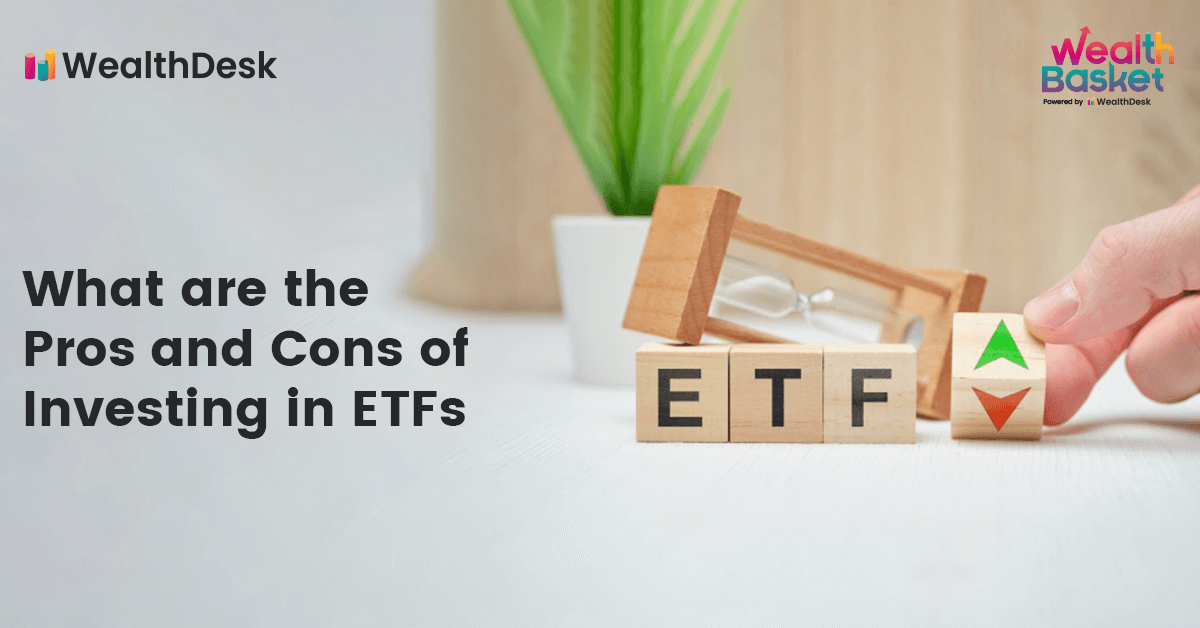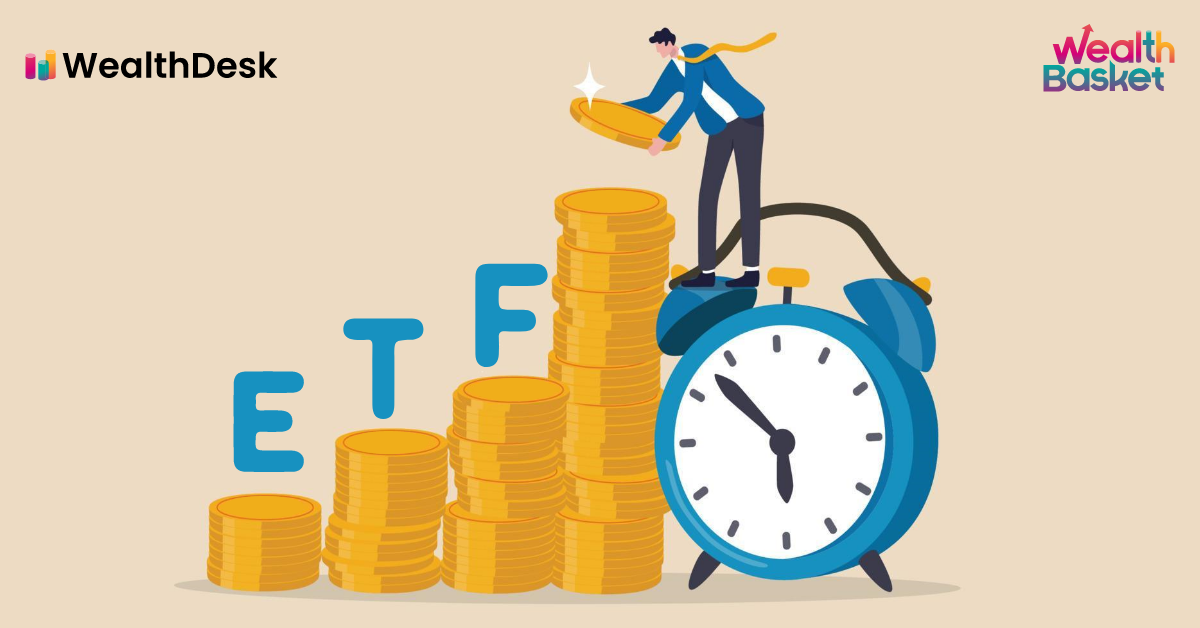- ETF investment in India has surged rapidly in the last two years, reaching ₹ 2.9 Lakh Crore by December 2021, with an 88% increase from its level in the 2020 year-end.
- From across the globe, ETFs represent 15% of all fund assets.
The Exchange Traded Funds (ETFs) have suddenly become popular among investors due to their dual ETF advantages. The passively managed funds track the index to replicate the securities and returns of those securities. However, there are certain risks involved in investing in ETFs.
This article explains the advantages of ETFs and a brief on ETFs, types of ETFs, and ETF returns in India.
What is an Exchange Traded Fund (ETF)?
ETF is a basket of securities that tracks a specific index such as S&P BSE 500 ETF, Axis Healthcare ETF, etc., to duplicate the index performance. It thus provides features of investing in stocks and mutual funds as follows:
- ETFs are traded on the exchange on a real-time basis
- The fund managers passively manage ETFs
Now, let’s look at the types of ETF funds in India:
Types of ETFs
Different ETFs track varieties of other indexes, and based on the index they track, there are several types of ETF investments in India.
Sector ETFs track stocks of companies of a particular sector; for example, financial services ETF will invest money in the same companies as the financial services index will have and try to duplicate its performance.
Market ETFs will follow the index of a particular market, for example, Nifty, S&P BSE 500, etc.
Commodity ETFs track the prices of the commodities, such as gold ETFs track the price of physical gold in the market, and it will replicate the price fluctuation on its portfolio.
Fixed Income ETFs, for example, bond ETFs, follow the performance of listed bonds and reflect the price changes in the fixed income ETFs.
Apart from the above, other types of ETFs are available in India, such as Real Estate ETF and Infrastructure ETF.
Now that you know about the types, it takes us to our next section of ETF advantages.
Let’s Talk About ETF Benefits
Greater Liquidity
Since ETFs are traded on the exchange, you can encash the money invested in the ETFs in times of urgency, thus, providing you with greater liquidity.
Minimises Risks
ETFs invest across securities in the sector, market or commodities, and hence, it minimises the risk of investment since it tracks entire index performance that consists of several securities.
Simplified Asset Allocation
ETFs, offer simplified asset allocation by giving extended exposure to broad equity markets. Otherwise, it would be pretty challenging if the individual investors had to allocate assets independently.
Real-Time Trading
One of the ETF advantages is that they are traded on the exchange, and hence, it provides flexibility in buying and selling the units/stocks of ETFs. Moreover, its price is updated on a real-time basis, and it does not need to depend on the Net Asset Value (NAV).
Cost-effective
ETFs are offered at much lower costs that could be as low as 0.2% per annum, and hence, they are budget-friendly investment instruments.
ETF Tax Advantage
ETFs generate smaller turnover, and in return, the capital gains will be less than those generated by the actively managed mutual funds. Therefore, ETFs are more tax-efficient but not tax-free, and they are still taxable when you make capital gains from them.
Risk-hedging Vehicle
ETFs can be one of the most effective risk-hedging instruments as you can use them to hedge the market risk. When you think the stock market will fall, you can hedge the risk of price drop by short-selling (borrowing ETFs to sell now at higher prices and buying at a future date when the price falls).
Arbitrage Between Cash and Futures
ETFs bridge the cash and the futures market gap and are used as arbitrage, and it also allows using cover options strategies on the index.
ETF Returns in India
Below are some best exchange-traded funds in India offering better returns as of 7-Jan-2022.
| Fund Name | 1 Yr Return (% p.a.) | 3 Yr Return (% p.a.) |
| Motilal Oswal NASDAQ 100 ETF | 27.29 | 38 |
| HDFC Sensex ETF | 12.97 | 22.06 |
| SBI – ETF Sensex | 25.35 | 19.75 |
| Aditya Birla Sun Life Gold ETF | -6.67 | 13.36 |
| Invesco India Gold ETF | -6.84 | 14.41 |
Disadvantages of ETFs
While ETFs are way better than the other mutual funds in terms of liquidity, cost, the flexibility of trading, etc., there are certain risks of investing in ETFs. Although you can mitigate these risks by carefully planning your investment strategy, you can not ignore them. Let’s learn which are the disadvantages of ETF investment in India.
Cost of Tracking Errors
ETFs track the performance of various indexes, but they do not precisely copy these indexes, meaning, if a particular stock in an index underperforms, the ETF will not show the exact price movement in the fund.
The difference between the index return that the ETF is tracking and the ETF’s actual return is called the Tracking Error. The risk of having more tracking errors is one of the most crucial disadvantages of ETFs.
Underlying Market Volatility
The ETFs are also prone to market risk as the market fluctuation will affect the underlying securities of the ETFs.
No Control Over Stock Selection
You do not get ownership to select which stocks you would invest your money in. You can only determine which ETF to invest in, but you can not add/remove any security from a particular ETF.
Asset Risk
The ETFs are exposed to the risks every asset in the ETF is exposed to. For example, if a fixed income asset is exposed to credit, liquidity and interest risk, the ETF will also be exposed to those underlying asset risks.
Final Thoughts
Every investment will have some pros and cons, but when
you understand the risks of investing in an instrument,
you can mitigate them by implementing an effective
investment strategy. ETF returns can also be optimised
by understanding ETF benefits and disadvantages of
ETFs.
At WealthDesk, we provide baskets of ETFs
and stocks, called
WealthBaskets, carefully designed by SEBI-approved professionals.
FAQs
Since ETFs offer diversification by investing in various securities, they offer optimised returns with minimum risks. Hence, it is a good investment option for long-term growth.
Although ETF investments are well-diversified across securities of different sectors, it is not 100% true that they are always safer than stocks. Certain ETFs invest in highly risky sectors, too.
Below are some
top-performing ETFs
and their returns in India:
Fund Names
– SBI – ETF BSE 100 –
13.74
– LIC MF ETF – Nifty
100 – 13.67
– ICICI Prudential
Nifty ETF – 15.42
– Nippon ETF
Nifty BeES – 14.18
*Return (% p.a.) as of
19th Jan 2022


















